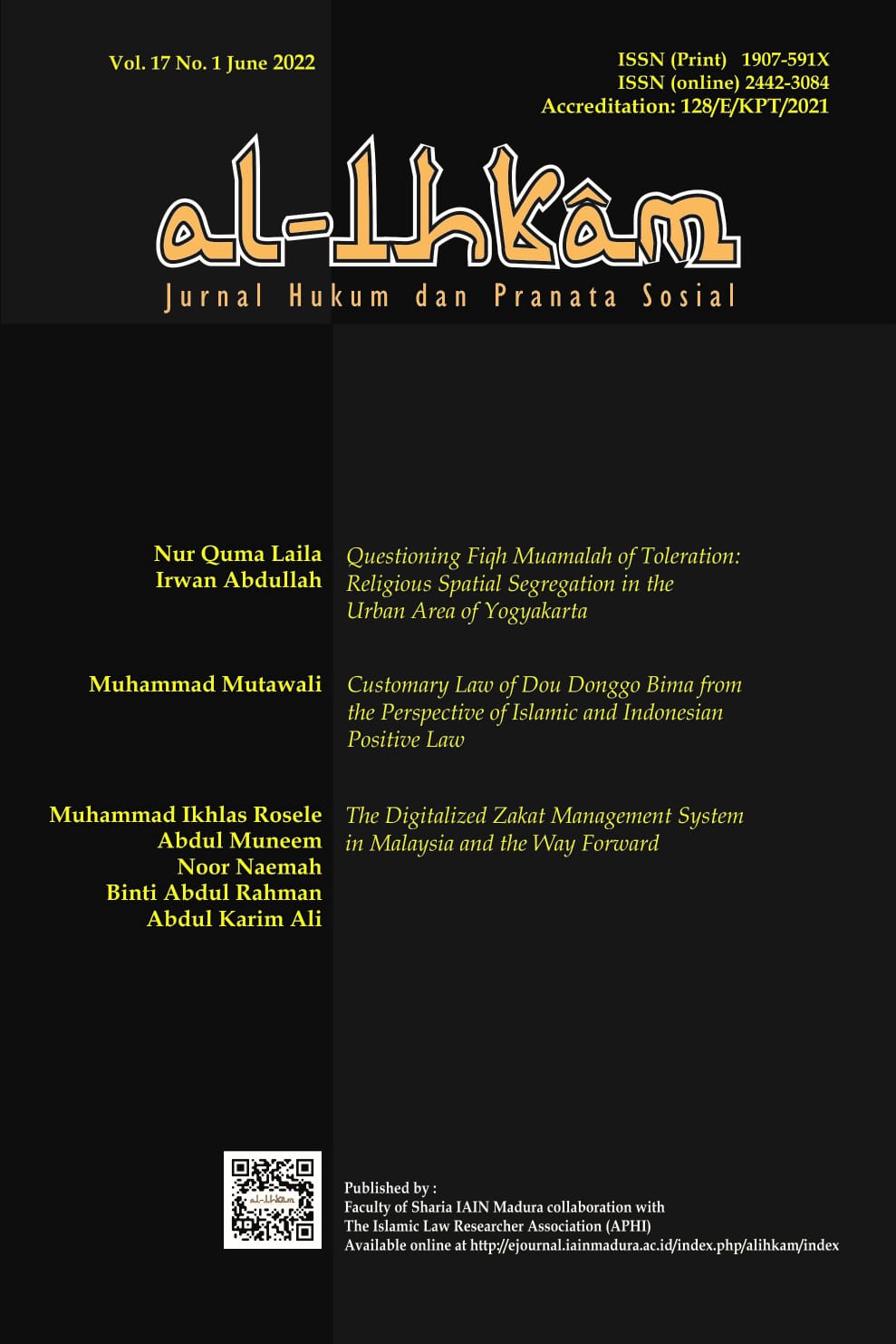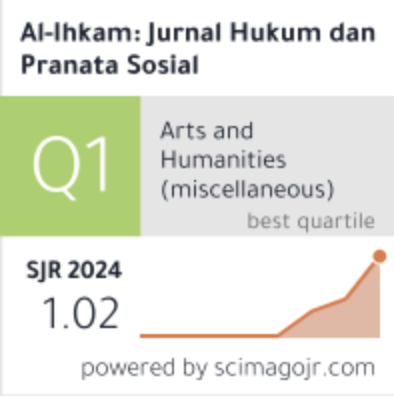The Dynamic of Worship and Responses of Nahdlatul Ulama Members in Bantul, Yogyakarta, Toward the Indonesian Council of Ulama's Fatwa on the Worship During the Covid-19 Pandemic
 Abstract views: 922
,
Abstract views: 922
,
 PDF downloads: 556
PDF downloads: 556
Abstract
This research explains the dynamic of worship in Bantul, Yogyakarta, as well as Nahdlatul Ulama (NU) members’ responses toward the fatwa of the Indonesian Council of Ulama (MUI) on the worship during the Covid-19 pandemic. MUI’s fatwa rose different responses ranging from obedience, resistance and ignorance. We argue that these differences stem from different characteristics of religiosity. Looking closely at this, this research studies the map of responses of NU people by focusing on the questions: (1) How was dynamic of worship during the pandemic in Bantul? (2) How did Bantul people respond to the MUI’s fatwa? (3) What factors formed the differences in their responses? The data are collected through interviews with seven informants, observation, and focused-group discussions. Through sociological analysis referring to obedience and disobedience theory, we found that the unprecedented dynamic was found in the worship during the pandemic, such as at Pleret, in the case of several Friday prayer spots in one single village. Meanwhile, the NU members’ responses to the fatwa into two patterns: reception and resistance. The forms of reception are (1) accommodation by observing all advice described in the fatwa and (2) contextualization by adjusting the advice in the fatwa to suit the local needs. It came from the structural influence of the organization of NU and people literacy. Meanwhile, the forms of resistance are (1) reactive-declarative refusal and (2) passive-permissive refusal. These patterns are influenced by a religiously fatalistic perspective and by the figures’ reluctance to prohibit people from carrying out worship normally as before the pandemic.
Downloads
References
Akmaliah, Wahyudi. “When Ulama Support a Pop Singer Fatin Sidqiah and Islamic Pop Culture in Post-Suharto Indonesia.” Al-Jami’ah 52, no. 2 (2014): 351–373.
Al-Hadhrami, Salim ibn ‘Abdullah ibn Sumair. Safînah Al-Najâh. Surabaya: Dâr al-‘Ilm, n.d.
Al-Syâfi’iy, Muhammad Nawawi ibnu Umar al-Jâwi al-Bantaniy. Kâsyifah Al-Sajâ Syarh Safînah Al-Najâ. Limassol: Dâr ibn Hazm, 2011.
Alnizar, Fariz. “Pretext for Religious Violence in Indonesia: An Anthropolinguistic Analysis of Fatwas on Ahmadiyya.” Studia Islamika 26, no. 3 (2019).
Arifin, Zaenal. “Kepemimpinan Kiai Dalam Ideologisasi Pemikiran Santri Di Pesantren-Pesantren Salafiyah Mlangi Yogyakarta.” Inferensi 9, no. 2 (2015): 351.
Firma, Tri Bunga. “Normal Baru Dalam Praktik Keagamaan Islam Pada Masa Pendemi Di Kota Padang.” Al-Adyan: Journal of Religious Studies 1, no. 2 (2020): 144–162.
Firmansyah, Heri. “Qawaid Fiqhiyyah Dalam Fatwa Majelis Ulama Indonesia.” Al-Qadha: Jurnal Hukum Islam dan Perundang-Undangan 6, no. 2 (2019).
Habibaty, Diana Mutia. “Peranan Fatwa Dewan Syariah Nasional-Majelis Ulama Indonesia Terhadap Hukum Positif Indonesia.” Jurnal Legislasi Indonesia 14, no. 4 (2017). https://e-jurnal.peraturan.go.id/index.php/jli/article/view/125.
Hasyim, Syafiq. “The Council of Indonesian Ulama (Majelis Ulama Indonesia, MUI) and Religious Freedom.” Irasec’s Discussion Papers, no. 12 (2011): 1–26.
Hidayah, Nur. “Dari Jabariyah, Ke Qadariyah, Hingga Islam Progresif: Respons Muslim Atas Wabah Corona Di Indonesia.” SALAM: Jurnal Sosial dan Budaya Syar-i 7, no. 5 (2020): 423–438.
Iswahyudi, . “MUI Dan Nalar Fatwa-Fatwa Eksklusif.” Al-Ihkam: Jurnal Hukum & Pranata Sosial 11, no. 2 (2017): 361.
Johar, Fitri. “Kekuatan Hukum Fatwa Majelis Ulama Indonesia (Mui) Dari Perspektif Peraturan Perundang-Undangan Di Indonesia.” Badilag. Last modified 2019. Accessed May 26, 2022. https://badilag.mahkamahagung.go.id/artikel/publikasi/artikel/kekuatan-hukum-fatwa-majelis-ulama-indonesia-mui-dari-perspektif-peraturan-perundang-undangan-di-indonesia-oleh-al-fitri-johar-s-ag-s-h-m-h-i-11-1.
Kukuh. “Di Tengah Covid-19, 220 Masjid Di Yogya Gelar Salat Id | Gaya Hidup.” Gatra. Last modified May 2020. Accessed May 26, 2022. https://www.gatra.com/news-479778-gaya-hidup-di-tengah-covid-19-220-masjid-di-yogya-gelar-salat-id.html.
Mohay Faisal. “PBNU Keluarkan Edaran Pelaksanaan Salat Tarawih Dan Idul Fitri Dalam Keadaan Pandemi Covid-19.” Tribunnews. Last modified 2020. https://www.tribunnews.com/corona/2020/04/04/pbnu-keluarkan-edaran-pelaksanaan-salat-tarawih-dan-idul-fitri-dalam-keadaan-pandemi-covid-19.
Muhammadiyah. “Edaran PP Muhammadiyah Tentang Tuntunan Idulfitri 1442 H Dalam Kondisi Pandemi Covid-19 - Muhammadiyah.” Muhammadiyah.or.Id. Last modified 2021. https://muhammadiyah.or.id/edaran-pp-muhammadiyah-tentang-tuntunan-idulfitri-1442-h-dalam-kondisi-pandemi-covid-19/.
_________. “Edaran PP Muhammadiyah Tentang Tuntunan Idulfitri 1442 H Dalam Kondisi Pandemi Covid-19 - Muhammadiyah.” Muhammadiyah.or.Id. Last modified 2021. Accessed May 26, 2022. https://muhammadiyah.or.id/edaran-pp-muhammadiyah-tentang-tuntunan-idulfitri-1442-h-dalam-kondisi-pandemi-covid-19/.
MUI. “FATWA NO 14 TAHUN 2020 – PENYELENGGARAAN IBADAH DALAM SITUASI TERJADI WABAH COVID-19 – Majelis Ulama Indonesia.” MUI Digital. Last modified 2020. Accessed May 26, 2022. https://mui.or.id/berita/27674/fatwa-penyelenggaraan-ibadah-dalam-situasi-terjadi-wabah-covid-19/.
Mushodiq, Muhamad Agus, and Ali Imron. “Peran Majelis Ulama Indonesia Dalam Mitigasi Pandemi Covid-19 (Tinjauan Tindakan Sosial Dan Dominasi Kekuasaan Max Weber).” SALAM: Jurnal Sosial dan Budaya Syar-i 7, no. 5 (2020).
Organization, World Health. “Penggunaan Masker Dalam Konteks COVID-19.” World Health Organization (2020): 1–23. https://www.who.int/docs/default-source/searo/indonesia/covid19/penggunaan-masker-dalam-konteks-covid-19.pdf?sfvrsn=9cfbcc1f_5.
Passini, Stefano, and Davide Morselli. “Authority Relationships between Obedience and Disobedience.” New Ideas in Psychology 27, no. 1 (2009): 96–106.
Ramdhani, Jabbar. “Warga Demo Masjid Ditutup Untuk Tarawih Dan Jumatan, Polisi Ajak Dialog.” Detik. Last modified 2020. Accessed May 26, 2022. https://news.detik.com/berita/d-4998650/warga-demo-masjid-ditutup-untuk-tarawih-dan-jumatan-polisi-ajak-dialog.
Saepudin, Didin. “Kedududukan Majelis Ulama Indonesia Di Tengah Umat Islam Dan Pemerintah.” Universitas Indonesia, 1987.
Sahma Pane, Abu. “Pro Kontra Larangan Sholat Jum’at Di Tengah Wabah Corona : Okezone Tren.” Okezone. Last modified 2020. Accessed May 26, 2022. https://www.okezone.com/tren/read/2020/03/19/620/2185963/pro-kontra-larangan-sholat-jum-at-di-tengah-wabah-corona.
Sarip, Diana Fitriana, Elya Kusuma Dewi. “Mendudukkan Fatwa MUI Sebagai Doktrin Perundang-Undangan.” Jurnal Legislasi Indonesia 16, no. 3 (2019).
Sholeh, M. Asrorun Ni’am. “Towards a Progressive Fatwa: MUI’s Response to the COVID-19 Pandemic.” AHKAM : Jurnal Ilmu Syariah 20, no. 2 (2020). https://journal.uinjkt.ac.id/index.php/ahkam/article/view/17391.
Syahputra, Iswandi. “Activities on Twitter and the 212 Defend Islam Rally through the Perspective of the Indonesian Ulema Council.” Al-Jami’ah 58, no. 2 (2020): 323–354.
Tim Sekretariat MUI. 20 Tahun Majelis Ulama Indonesia. Jakarta: Sekretaris MUI, 1995.
Copyright (c) 2022 AL-IHKAM: Jurnal Hukum & Pranata Sosial

This work is licensed under a Creative Commons Attribution-ShareAlike 4.0 International License.
In order to be accepted and published by Al-Ihkam: Jurnal Hukum dan Pranata Sosial, author(s) submitting the article manuscript should complete all the review stages. By submitting the manuscript, the author(s) agreed to the following terms:
- The copyright of received articles shall be assigned to Al-Ihkam: Jurnal Hukum dan Pranata Sosial as the publisher of the journal. The intended copyright includes the right to publish articles in various forms (including reprints). Al-Ihkam: Jurnal Hukum dan Pranata Sosial maintain the publishing rights to the published articles.
- Authors are permitted to disseminate published articles by sharing the link/DOI of the article at Al-Ihkam: Jurnal Hukum dan Pranata Sosial. Authors are allowed to use their articles for any legal purposes deemed necessary without written permission from Al-Ihkam: Jurnal Hukum dan Pranata Sosial with an acknowledgment of initial publication to this journal.
- Users/public use of this website will be licensed to CC-BY-SA.



.png)
_1.png)


_page-00011.jpg)


